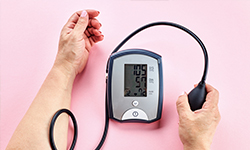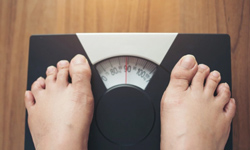
Steps To Manage And Prevent Hypertension

Hypertension is a condition that causes blood vessels to tighten and the heart to work harder. It’s also known as high blood pressure and can lead to potentially fatal complications like heart attacks and strokes. Therefore, it’s essential to take care of your health by eating healthy, exercising, getting enough sleep, managing stress levels, and not smoking. Fortunately, there are many ways to control hypertension by changing diet or lifestyle habits. Here are some tips for managing and preventing high blood pressure:
5 Ways To Manage High Blood Pressure
Below are five effective ways to manage high blood pressure:
-
Eat a Healthy Diet
Monitoring your blood pressure at home is a great way to keep it under check. It can also alert you and the doctor to any potential health problems. There are many blood pressure monitors available in the market for this purpose. Before you start, talk to your doctor about home monitoring. It’s also advisable to visit your doctor regularly to monitor your blood pressure and seek consultation.
-
Take Your Medicine On-Time
One of the most critical aspects of managing high blood pressure is taking your medicine on time. This will help lower blood pressure in the long term and help prevent side effects such as headaches or dehydration. Skipping blood pressure pills can lead to an increase in both systolic and diastolic levels, so it’s best advised not to do that.
-
Manage Diabetes
There is a direct link between diabetes and hypertension. Diabetes can cause damage to arteries and make them susceptible to hardening, in a condition called atherosclerosis. That can cause high blood pressure, which if not treated, can lead to further complications. This makes managing diabetes particularly important for curbing the threat of hypertension. One of the most critical aspects of managing diabetes is maintaining stable blood sugar levels by eating healthy foods and taking your medications as prescribed. Furthermore, it’s necessary to monitor what type/source carbohydrates they consume and ensure these nutrients don’t contain too many added sugars, which could place unnecessary strain on our already overworked pancreas.
-
Make Lifestyle Changes
Another essential step to managing high blood pressure is making lifestyle changes. Lifestyle changes are a crucial component of both the prevention and management of hypertension. A healthy lifestyle is the most risk-free way to deal with the prospect of, or the reality of, this disease. Here are the primary ways you can modify your lifestyle :
- Eat a healthy diet; consume more fruit and vegetables than salty, sugary, or processed food.
- Stay hydrated with lots of water intake every day.
- Avoid smoking or any tobacco product.
- Get adequate rest every day.
-
Exercise Daily
Regular physical activity can reduce your blood pressure by 5 to 8mm Hg if you have high blood pressure. However, you must be consistent as if you stop exercising; your blood pressure could rise again. On the other hand, regular exercise can lower blood pressure if you have hypertension.
Walking, running, cycling, swimming, and dancing are all good options to lower blood pressure. Another option is High-Intensity Interval Exercise or HIIT, which alternates short bursts of intense activity and subsequent recovery periods. Before starting any workout, it’s always advisable to discuss it with your doctor first.
5 Ways To Prevent High Blood Pressure
Prevent high blood pressure with the following tips:
-
Eat a Healthy Diet
If you have high blood pressure, a diet rich in whole grains, fruits and vegetables, and low-fat dairy products can help lower blood pressure by as much as 11 mm Hg. This eating plan is called the Dietary Approaches for Stopping Hypertension (DASH).
Although it is not easy to change your eating habits, these tips can help you adopt a healthier lifestyle.
- Keep a food diary. Keep track of what you eat and how much. Even if you keep a food diary for a week, it can reveal surprising details about your eating habits.
- You might consider boosting your potassium intake. Potassium can reduce the impact of sodium on blood pressure. However, potassium is best obtained from food (vegetables and fruits) rather than through supplements. Talk to your doctor and a certified nutritionist about the best potassium level for you.
- When shopping for food items, be sure to read the labels and follow your healthy eating plan when dining out.
-
Maintain a Healthy Weight
As weight increases, blood pressure can rise as well. An overweight person can also have trouble breathing during sleep (sleep disorder), increasing the blood pressure further.
The best lifestyle change to control blood pressure is weight loss. If you are overweight or obese, even a minor weight loss can reduce blood pressure. For example, with each kilogram (or 2.2 pounds) of body weight lost, your blood pressure will drop by approximately 1 millimeter (mmHg).
You should not only lose weight but also watch your waistline. High blood pressure can be made worse if you have too much weight around the waist.
In general :
- Men with a waist measurement greater than 40 inches (102 cm) are at the greatest risk of developing high blood pressure.
- Women who have a waist measurement greater than 35 inches (89 cm) are at higher risk of developing high blood pressure.
These numbers can vary between ethnic groups. Ask your doctor for more information about the relationship between weight management and high blood pressure.
-
Be Physically Active & Get Enough Sleep
One effective way to prevent high blood pressure is by staying active and getting plenty of sleep.
Physical activity, in the form of sports or even day-to-day activities, increases your heart rate, which helps stabilize your blood pressure. In addition, staying stress-free by getting enough sleep will make it easier for you to maintain and improve certain aspects of yourself, like weight loss or diabetes management.
-
Do Not Smoke
Every cigarette you smoke raises your blood pressure for several minutes after you have finished. Your blood pressure will return to normal by quitting smoking. Stopping smoking can lower your risk of developing heart disease and improve your overall health. People who quit smoking are more likely to live longer than those who have never stopped.
-
Limit Your Alcohol Intake
You can have both good and bad effects on your health from alcohol. For example, you can lower your blood pressure by drinking alcohol in moderation. However, consuming alcohol in excess can lead to a significant increase in blood pressure. It can also decrease the effectiveness of blood pressure medication.
Final Thoughts
Hypertension is a condition that affects many people, but it’s not something you have to resign yourself to. With the help of lifestyle and diet changes and proper care for your body, hypertension can be managed effectively. Be sure to consult your doctors regularly and build a systematic blood pressure management plan as per their advice.
DISCLAIMER
This article does not substitute the need for expert medical advice when needed. Talk to your healthcare provider about worrying signs of high blood pressure.











Comments (0)
No comments found.Add your comment